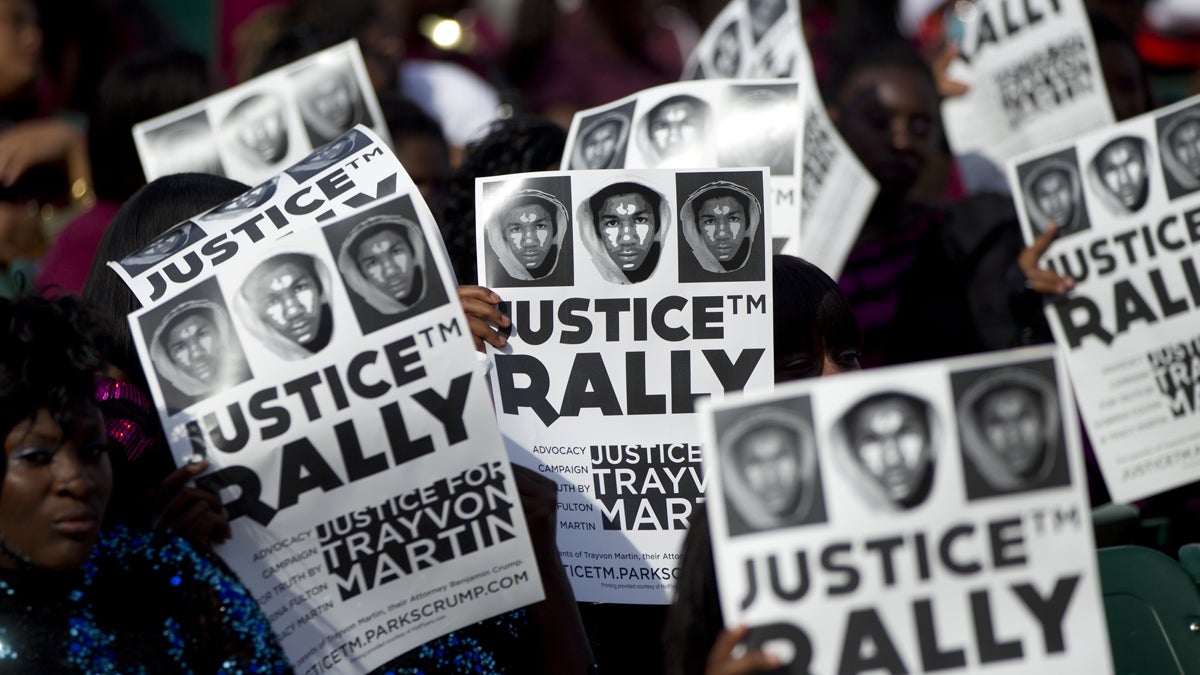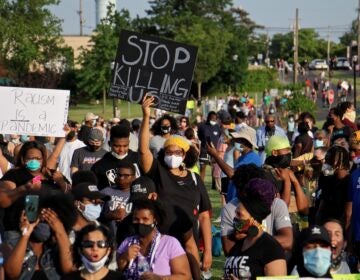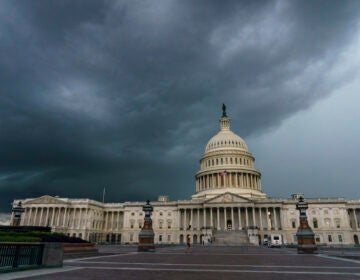5 years since Trayvon Martin, and black lives still don’t matter

People at a rally in downtown Miami in 2012 hold signs demanding justice for Trayvon Martin. (AP Photo/J Pat Carter, file)
Cruising through 7th grade, I truly believed I was invincible. On Feb. 26, my life changed forever when another young black boy, by the name of Trayvon Benjamin Martin, walked into a 7-Eleven in Sanford, Florida, wearing a dark-gray hooded sweatshirt.
Flashback: Late February 2012, I was cruising through my 7th-grade year at a Quaker friends school in Abington, Pennsylvania. I truly believed, as a soon-to-be 13-year-old, I was absolutely invincible. My life was great, I had great friends and teachers, and I had finally found a school that was welcoming for me as a black boy.
On Feb. 26, my life changed forever.
That day, another young black boy, by the name of Trayvon Benjamin Martin, walked into a 7-Eleven in Sanford, Florida, wearing a dark-gray hooded sweatshirt. As any 17-year-old kid would do, Trayvon walked around inside the store and ended up purchasing a pack of Skittles and a watermelon Arizona iced tea, left the store, and proceeded back to his dad’s house. This was the last known whereabouts of Trayvon Martin, and the last time his family would see him alive.
I’m am going to skip the altercation between Trayvon Martin and George Zimmerman, because killing a young boy simply out of suspicion was outrageous. I can remember the next weeks looking on my phone, repeatedly scrolling through my Facebook feed, seeing headlines like “What happened the night Trayvon Martin died” and “Where’s the Outrage Over the Killing of Trayvon Martin?”
Looking on as a terrified and confused 13-year-old black male, I couldn’t comprehend the true fragility of life. I followed the Trayvon Martin story like a hawk, reading countless articles, listening to his parents recount his life, and then read the media saying he was a “thug.” These juxtapositions made my head spin as I thought to myself, what can I do?
It took me until the end of 2013 to finally understand how the societal system worked against blacks. In this year, I had many stark realizations about America. The first being that simply because of the amount of melanin in my skin I am already categorized in a way that makes it impossible to transcend societal misconceptions. I then realized that I needed to change the way I lived, catering to the fears of others for my own survival.
I do not know how to describe my feelings during the summer of 2014, a notorious year for police brutality. At first, I was excited, I was starting my sophomore year at my local predominantly white private high school. Then in early August, this excitement was matched with a heightened sense of paranoia and a constant state of fear that has not stopped since. Michael Brown, Eric Garner, John Crawford III, Ezell Ford, and Dante Parker, were all killed within the span of a month. Five black males all killed by police in 30 days, all in different states. I realized then that this was a national problem, and boy was I right.
I was shocked by the number of black men and women the police killed and the lack of justice. Some of the names that the mainstream media picked up were Tamir Rice, Akai Gurley, and Tanisha Anderson, all gone too soon but never forgotten.
I began to educate myself and others about police brutality and learned more about police conduct codes and regulations. I held support group meetings at my school and was able to lead discussions about police brutality and gun violence here in Philadelphia.
In the midst of all of this I was growing up. That part is overlooked by the people who ask me why I do what I do.
When I turned 15, I was seeing videos of a 12-year-old boy being shot in his local park. I was just 15 when I saw Michael Brown lying in the street on live television. I was 15 when I had to have a conversation with my mom about how to act around police officers in America. A conversation like this shouldn’t have had to happen. I was 15 when I sat with my mom’s arms wrapped around me, crying, thinking about walking to school every day and what could happen to me. I was 15 when I realized black lives didn’t matter.
This feeling is not unique. Other young black men share the same experience and feel isolated because of the way they are perceived in America.
I sit here today reflecting on five years of dedication to diversity. My activism in and outside of school is primarily focused on the empowerment and inclusion of black males. I do this work simply because I have no choice. As 17, I am now the same age Trayvon Martin was when he was killed. That alone motivated me to take action.
Every waking hour of my life I have to be cognizant of my blackness and how others see me. I now know that in order to protect myself from the forces of the law, I must remove my hood, I must raise my hands, and I must refrain from reacting in charged situations.
It is now 2017. My president is no longer black like me. My race is still not accepted in society. And black lives continue not to matter.
—
Sam Gerlach is a senior at Springside Chestnut Hill Academy.
WHYY is your source for fact-based, in-depth journalism and information. As a nonprofit organization, we rely on financial support from readers like you. Please give today.




